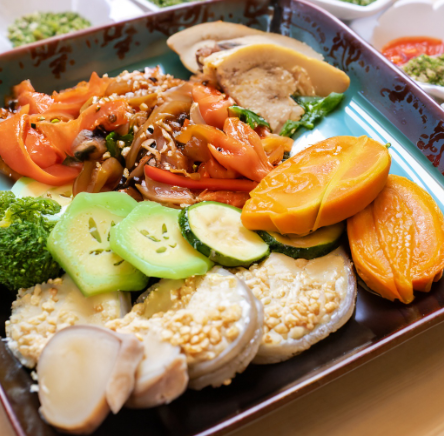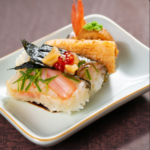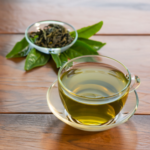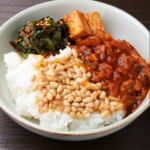Japan, a nation known for its longevity, holds the key to a healthier and longer life. Discover the 14 secrets to Japanese longevity and lifelong health in this article.

Japan, a land of cherry blossoms and ancient traditions, is also home to some of the world’s longest-lived individuals. With a significant portion of its population consistently living well into their 80s, 90s, and even beyond, Japan has earned its reputation as a haven for healthy aging. But what’s the secret behind this remarkable longevity? In this comprehensive article, we’ll delve into the 15 secrets of Japanese longevity, exploring how their lifestyle, diet, and mindset contribute to a longer, healthier life.
1. Balanced Diet – The Okinawa Way

The cornerstone of Japanese longevity is a balanced diet, particularly the Okinawan diet. This eating pattern emphasizes a variety of colorful vegetables, lean protein sources like tofu and fish, and carbohydrates from whole grains.
The Okinawans’ plate is a canvas of nutrients, providing essential vitamins, minerals, and antioxidants. This balance supports heart health, maintains a healthy weight, and reduces the risk of chronic diseases such as diabetes and hypertension.
2. Portion Control

In Japan, it’s not just about what you eat but how much you eat. Japanese culture emphasizes portion control, and smaller serving sizes are the norm.
This practice naturally helps prevent overeating, reducing the risk of obesity and its associated health issues.
3. Seafood Rich in Omega-3s

Japan’s extensive coastline provides access to a bounty of fresh fish, a staple in the Japanese diet. Fish such as salmon, mackerel, and sardines are rich in omega-3 fatty acids.
These healthy fats have anti-inflammatory properties, support heart health, and may even enhance cognitive function, contributing to a longer, healthier life.
4. Mindful Eating
Japanese culture places great importance on mindfulness during meals. Instead of rushing through a meal, taking time to savor and appreciate each bite can reduce stress, improve digestion, and enhance the overall dining experience.
5. Green Tea

The Japanese are known for their love of green tea, and for good reason. Green tea is a nutritional powerhouse, loaded with antioxidants like catechins.
These compounds have been linked to numerous health benefits, including improved brain function, enhanced metabolism, and a reduced risk of chronic diseases such as cancer.
6. Fermented Foods

Fermented foods like miso, natto, and kimchi are regular fixtures on the Japanese menu. These foods are rich in probiotics, which promote a healthy gut microbiome.
A balanced gut contributes to robust immune function, improved digestion, and reduced inflammation.
7. Low in Processed Foods
The Japanese diet is relatively low in processed foods, meaning fewer artificial additives, preservatives, and excess sugar. By minimizing the consumption of these unhealthy additives, the Japanese reduce their risk of obesity, diabetes, and heart disease.
8. Physical Activity
Physical activity is woven into the fabric of Japanese life. Walking is a common mode of transportation, and many seniors engage in low-impact activities like tai chi or gardening. Regular movement keeps muscles and joints agile, supports cardiovascular health, and enhances overall well-being.
9. Strong Sense of Community
Japanese society places a high value on community and social connections. Extended families often live together or in close proximity, reducing feelings of isolation and loneliness among the elderly. These close-knit bonds provide emotional support, reducing stress and fostering mental well-being.
10. Stress Management
Mindfulness practices such as meditation and traditional activities like tea ceremonies are integral to Japanese culture. These practices help manage stress, improve mental health, and create a sense of calm in daily life.
11. Healthy Work-Life Balance
Japanese companies have made efforts to promote a healthier work-life balance, reducing the culture of overwork known as “karoshi.” By encouraging employees to take regular breaks and prioritize their well-being, companies contribute to healthier and happier lives for their workforce.
12. Respect for Elders
Japanese culture places great value on respecting and caring for elderly family members. It’s common for multiple generations to live together, providing seniors with a sense of purpose and belonging. This strong family support system positively impacts mental and emotional health.
13. Hot Springs (Onsen)

Regular visits to hot springs, known as “onsen,” are a beloved tradition in Japan.
These natural thermal baths offer relaxation and numerous health benefits, including improved circulation, pain relief, and stress reduction.
14. Lifelong Learning
Many Japanese continue to pursue education and hobbies throughout their lives. This commitment to lifelong learning keeps their minds sharp and engaged, contributing to better cognitive health in their later years.
Japan’s lifestyle, diet, and mindset all play pivotal roles in fostering a longer, healthier life. By adopting some of these principles into our own lives, such as embracing a balanced diet, practicing portion control, and nurturing social connections, we can take meaningful steps toward achieving not just a longer life but a healthier and more fulfilling one as well.




